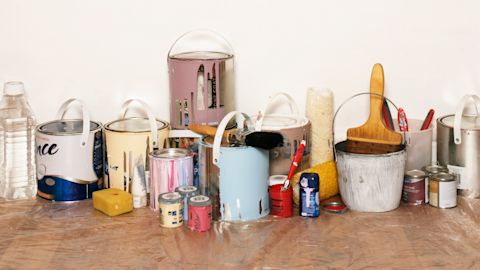Lots of us have leftover household cleaners, half-filled paint tins, old motor oils, nail polish bottles, lightbulbs and batteries taking up space at home. They sit under the kitchen sink, in cupboards and on dusty garage shelves.
We know these can’t go in the yellow lid bin for recycling, and we’d never pour them down the drain.
They can cause problems in the red lid bin too. Incorrectly discarded chemicals can spontaneously combust or leak into soil, pollute groundwater and threaten our wildlife.
Here’s what you need to know about disposing of those household nasties the right way.

Drop off your unwanted chemicals at a Chemical CleanOut event
Together with local councils, NSW Environment Protection Authority runs regular Household Chemical CleanOut events to help you dispose of your household chemicals safely.
The next free drop-off event in our area is on Saturday 19 October, 9am to 3:30pm at Alexandra Canal depot. Everyone is welcome – you don't need to live in our area to take part.
Since Household Chemical CleanOuts started in 2009, residents have safely disposed of 343 tonnes of household chemicals at these events.
By dropping off your unwanted household chemicals, not only will they be disposed of correctly, but they can often be recycled.

What to expect on the day
Now’s the time to check your cupboards, go through your kitchen and rummage through the shed. Check out what we’ll accept. We’ll take care of the rest.
This Chemical CleanOut is a drive-through event, so you must stay in your vehicle. Our team will show you where to drive and unpack items for you.
With that in mind, here’s how to get ready:
- Transport your items in tubs, sealed and in the boot, so you don’t breathe anything in and so our team can quickly and safely unpack items for you.
- Don’t mix anything and leave the sorting to the pros. Mixing chemicals can cause dangerous reactions.
- Keep your chemicals in their original containers to make them easier to identify. If you want to be extra prepared, set up a dedicated tub to collect used products until it’s time to drop them off.
- If you’ve lost the original label, just label the item with ‘unknown chemical’.
People walking or cycling are also welcome.

What happens to your chemicals after you drop them off
There’ll be a chemist on site, to identify any unknown chemicals and ensure all materials are correctly categorised. At the end of the day, the chemicals will be safely transported to a recycling facility where they’ll be weighed and sorted into 43 different categories. They’ll be prepared for recycling or safe disposal.
Many familiar chemicals from our homes get a second lease on life:
- Oils are processed into lubricants.
- Paints are mixed with other waste solvents and used as an alternative fuel in cement kilns, while the metal containers are recycled.
- Gas cylinders have remaining gas taken out, and the steel in the gas bottles is recycled. Undamaged bottles are tested and made available for hire, so they’re reused rather than recycled.
- Lead, acid and plastic in batteries are recovered and recycled into new batteries.
- Fluoro tubes, which contain mercury, are crushed to separate the phosphor powder from the glass. This powder is processed to capture any mercury, which is then sold for industrial uses. Leftover glass and metals are recycled.
Published 29 July 2019, updated 19 September 2024



